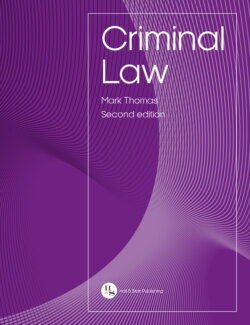Читать книгу Criminal Law - Mark Thomas - Страница 54
На сайте Литреса книга снята с продажи.
1.9Further reading
ОглавлениеAshworth, ‘Is the Criminal Law a Lost Cause?’ (2000) 116 LQR 225.
Ashworth, ‘Punishment, Compensation and the State’ (1986) 6(1) OJLS 86
Ashworth, and Blake, ‘The Presumption of Innocence in English Criminal Law’ [1996] Crim LR 306.
Ashworth, Sentencing and Criminal Justice (6th edn, 2015).
Baker, ‘The European Union’s “Area of Freedom, Security and (Criminal) Justice” Ten Years On’ [2009] Crim LR 833.
Bingham, ‘A Criminal Code: Must We Wait Forever?’ [1999] Crim LR 694.
Chalmers and Leverick, ‘Fair Labeling and Criminal Law’ (2008) 71 MLR 217.
Ferguson, ‘Codifying Criminal Law: The Scots and English Draft Codes Compared’ [2004] Crim LR 105.
Gardner, ‘Reiterating the Criminal Code’ (1992) 55 MLR 839.
Glazebrook, ‘Should We Have a Law of Attempted Crime?’ (1969) 85 LQR 27.
Hare, ‘A Compelling Case for the Code’ (1993) 56 MLR 74.
Hirsch and Roberts, ‘Legislating Sentencing Principles: The Provisions of the Criminal Justice Act 2003 Relating to Sentencing Purposes and the Role of Previous Convictions’ [2004] Crim LR 639.
Husak, ‘The Criminal Law as Last Resort’ (2004) 24(2) OJLS 207.
Lamond, ‘What Is a Crime?’ (2007) 27 OJLS 609.
Murphy, ‘The Principle of Legality in Criminal Law under the European Convention on Human Rights’ (2010) EHRLR 192.
Roberts, ‘Taking the Burden of Proof Seriously’ [1995] Crim LR 783.
Smith, ‘The Human Rights Act and the Criminal Lawyer: The Constitutional Context’ [1999] Crim LR 25.
Stevenson and Harris, ‘Simplification (of the Criminal Law) as an Emerging Human Rights Imperative’ (2010) 74 J Crim L 516.
Williams, ‘The Definition of a Crime’ (1955) 13 CLJ 107.
summary
•The criminal law refers to the study of criminal liability.
•Liability simply refers to the requirements that need to exist in order for a person to be guilty of a criminal offence.
•The criminal law functions to protect society, enforce rules and punish rule-breakers.
•The criminal law is built on a number of principles, including autonomy and welfare.
•Substantive criminal law must be distinguished from procedural law and evidential law.
•The elements of any offence are made up of the actus reus, mens rea and a lack of defence.
✓test Your Knowledge
Essay
‘The criminal law is designed to promote individual autonomy and fair warning. In its present state, it fails in its task’.’
Critically consider this statement in light of the so-called ‘principles’ of criminal law.
